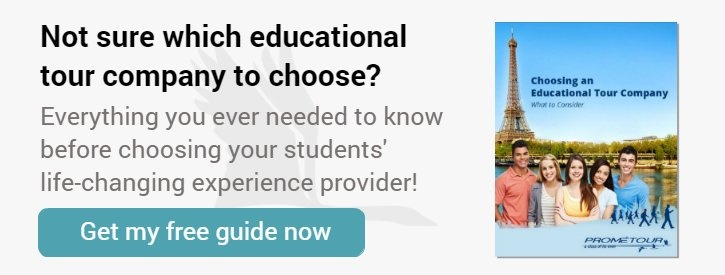When you start to research educational tours, you’ll quickly see that there really is a world of possibilities! Even after you’ve narrowed down your destination and picked a few interesting itineraries, you may find yourself with a difficult choice. Do you need to choose the lowest cost tour for your students, possibly sacrificing the quality of the activities on tour? Or do you focus on an experience-rich itinerary that meets your educational goals and try to convince your students’ parents that it’s worth the high price?
At Prométour, we know that it doesn’t have to either/or. We’re experts at finding ways to build high quality itineraries, with all the educational bells and whistles, at prices that your students’ families can afford. How do we do it? Well, there are a number of factors that go into the price of a tour, and playing with those variables means that we can often arrive at a very reasonable price for an amazing travel experience.
Before you call a tour consultant to explore the possibilities, consider in which of the following ways you could be flexible in planning your educational tour. They can have a big impact on your final price!
Plan in advance.
The more time we have to plan your tour, the more likely we will be able to secure the best prices for hotels, meals, airfare and more. Your students will also have time to spread their payments over many months, instead of having to pay in a few big chunks. Not only that, but they’ll have plenty of time to participate in team-building fundraising activities to offset the cost of their educational tour.more time we have to plan your tour, the more likely we will be able to secure the best prices for hotels, meals, airfare and more. Your students will also have time to spread their payments over many months, instead of having to pay in a few big chunks. Not only that, but they’ll have plenty of time to participate in team-building fundraising activities to offset the cost of their educational tour.
Travel in the off-season.
Prices are higher in the summer and on spring break. Consider travelling in the low season (that can vary by destination). Arrange with your principal and school board for traveling students to be able to take up to a week off from their classes. This article does a good job at explaining the pros and cons of each travel season in Europe.
Stay in one or two locations to reduce on-tour transportation costs.
Rather than travel to a new place every day, consider a city stay. It’s easy to cut costs if you don’t need the services of a tour bus and driver every day.
Cut a day or two from your itinerary.
Often, teachers find that they can cut a day or two from their travels, either setting a faster pace for their daily activities or prioritizing what they want to see and do.
Take advantage of free or low cost activities.
Rather than flying through lots of costly museums, reduce the price of site entrances by spending more time at one attraction. Don’t forget to take advantage of certain free activities that are often the most educational, such as spending time bartering at a market or visiting a school to interact with local students. Your tour consultant can help you schedule a balance of these types of activities and tourist attractions to meet both your educational goals and your budget.





